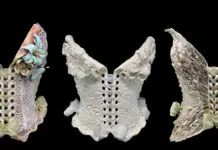To me, there’s long been an aura of survival around Western swing. After all, the genre itself – a rich synthesis of jazz, pop, blues, country and cowboy music – has managed to survive since the early ‘30s, when Texas expatriate Bob Wills carried it in infant form across the Red River and nurtured it into a strong and robust adulthood at Tulsa’s Cain’s Ballroom.
Also, as I was reminded recently, the annual Bob Wills birthday show at Cain’s is, as much as anything, a celebration of fans who have survived, along with the music, for another year, as they return from all over to greet old friends and listen and dance once more to the music that was playing when a lot of them first fell in love, often with one another.
The survival theme carries on in Mandolin Magic, a new disc from Arkansas Western-swing musician James Paul Moore. Recorded in February at Tulsa’s Drapp Studio, the CD features a combination of classic and original songs played by a group that includes the well-known Tulsa musicians Darrel Magee on guitar and Mel Buckner on drums. It’s the second album for Moore, following 2001’s Central Standard Time. He played fiddle on that one. On this one, however, he plays mandolin.
The reason for that switch also helps explain why Mandolin Magic is not just a dandy Western-swing disc, but also a metaphor for surviving.
“I’ve been a musician for most of my life; I’ve played swing-style fiddle for about 25 years,” Moore says. “In the summer of 2007, I went in for a physical, and out of the blue, I found out I had lymphoma.
“I’d been blowin’ and goin’, burning the candle at both ends,” he adds. “I had a psychology practice up in Jonesboro, Ark., working all the time. And then, I was going through that whole barrage of chemotherapy and radiation.”
Moore’s life was not only suddenly upended. He also came very close to losing the ability to play an instrument.
“One of the side effects of the chemotherapy is that it can scar up blood vessels, make them tighten up like steel cables,” he explains. “The doctor knew I was a musician, so he pulled me off one of the medicines. He probably saved my hands.”
Before the treatments began, however, Moore began thinking about another man named Moore. Tiny Moore was no relation, but anyone who knows Western swing knows his name, thanks to Tiny’s work with Bob Wills and many others. Tiny Moore had played a custom-made instrument with an extra string, and soon, Paul Moore was looking for a builder who could make him a five-string mandolin like Tiny’s. Paul and his wife, Louella, found three, finally deciding on the Nashville-based Jonathan Mann.
“The weekend before I started my treatments, we jumped in the car and drove down to Nashville,” recalls Moore. “I didn’t want to waste any time; frankly, I didn’t know how much longer I’d be here. So we went down to his house, sat down in his living room, and I played some instruments he had. I commissioned him to build it that day.
“That was probably in late August. He knew I was sick, and he told me, ‘I think I can have it for you before Christmas.’ Sure enough, the week before, he called me and said it was ready.”
By then, Moore was deep into treatment. He’d go in for his chemotherapy, sit back in one of the recliners provided for the patients, and while the chemicals were pumping through his body, his mind would be on music.
“I was sitting there one day, and I thought, ‘You know, I want to do another album, and I want to play mandolin on it,’” he remembers. “That gave me something to live for. All that winter, when I was sick as a dog, no hair on my body, I’d sit and play the mandolin for hours.”
After months of enduring cancer medication, Moore finally felt well enough to get back on a bandstand. The first gig he got as a mandolin player was with keyboardist Robert Huston and his Barely Can Playboys, who were performing at the Old Fort Days Rodeo in Fort Smith, Ark.
What made Moore’s re-emergence especially noteworthy was the fact that it came on “Pink Night” at the rodeo, supporting the cancer-fighting efforts of the Susan G. Komen for the Cure organization. (Huston and Moore had grown up together in Waldron, Ark., lost track of one another as adults and then found, to their mutual delight, that both loved and played Western swing.)
Soon Moore was recruiting musicians, including Huston, from all across the country for his new CD project. He found a bassist and drummer from Washington – and then was amazed when both revealed that they had also been fighting cancer. The lead guitarist for the sessions, Texas-based Gene Gimble, brother of Western-swing great Johnny Gimble, came aboard, and it turned out he’d had cancer as well.
“So there for a while,” Moore says, “we went through a big deal where four of the six people on this project were cancer survivors, and this was going to be a celebration of surviving cancer.”
The other two participants were rhythm guitarist David Staples, from Tennessee, and keyboardist Huston, with Moore’s wife, Louella, pitching in as a singer and songwriter. Although none of the players were from Tulsa, Moore knew the disc had to be recorded there, not only because it would be “almost a pilgrimage to where it all began,” but also for the city’s proximity to Wagoner and Western Hills Lodge, where the Western Swing Music Society of the Southwest and the Oklahoma Fiddlers Association stage annual jams and dances that draw players from across the country.
Moore himself had participated in those events, and he knew that he’d have a big pool of musicians nearby if he timed his recording session to coincide with a Western Hills jam.
So he reserved the studio for a day just before the event. It was a wise move. Just as Moore was finalizing the date, the original drummer and bassist had to pull out because of complications from their treatments, and Gimble, the third of the four cancer survivors slated for the disc, developed health problems as well. With time running out, Moore secured a bassist from Mountain View, Ark., named Penny Miller – a regular at the Wagoner events – and local drummer Buckner. Then, when Gimble had to beg off – on the eve of the studio session – Moore got Magee to come to Tulsa’s Ambassador Hotel, the band’s temporary headquarters.
“Darrel was the hero of the project,” says Moore. “He came over and sat in with us on our practice session, and in the middle of it, he kind of stood up, stretched himself, and said, ‘This is pretty tough stuff, but I can’t remember when I’ve had so much fun.’
“So we got him a room and he took his guitar and the chord charts up there and spent most of the night and morning studying our arrangements.
“Then we went into the studio,” Moore adds, “and he just blew us away.”
So, through challenges and changes, illness and recovery and relapse, comes Mandolin Magic, one of the newest recordings in a musical style that’s nearly 80 years old.
Western swing, indeed, goes on. The music survives. And so does Paul Moore. For more information, visit www.
jpaulmooremusic.com.

























